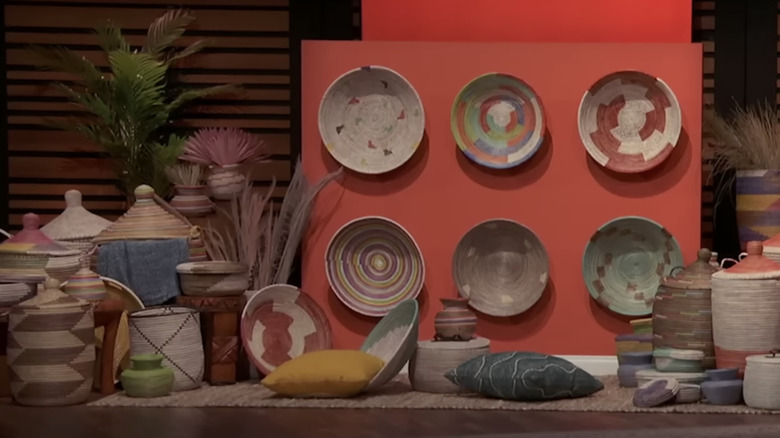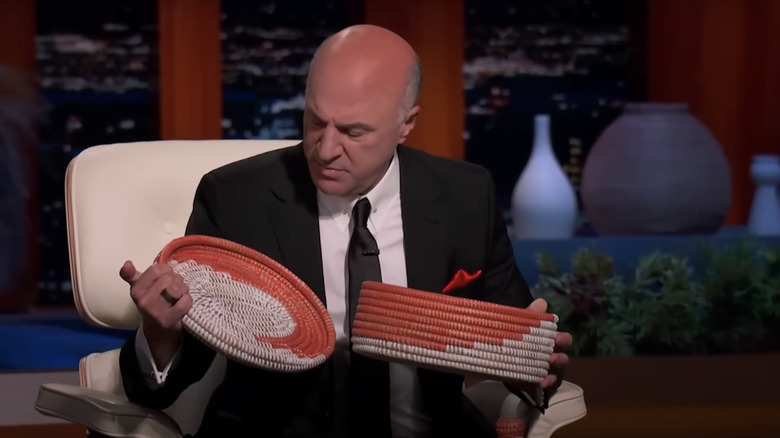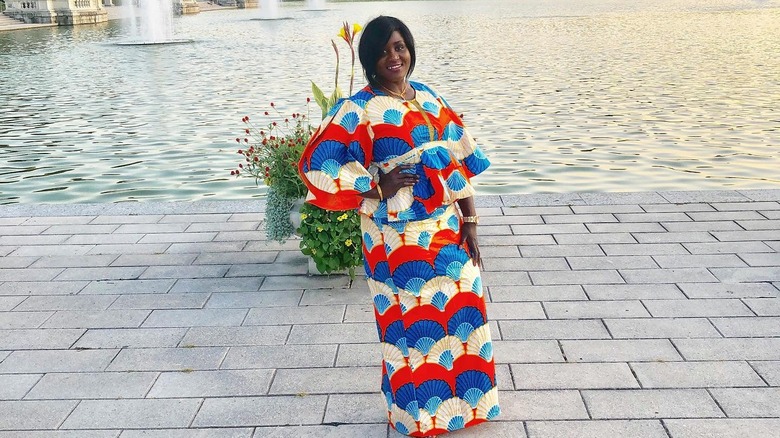Whatever Happened To Expedition Subsahara African Baskets After Shark Tank Season 14?
Sofi Seck brought her hand-woven baskets to "Shark Tank" in 2022. Originally from Senegal, Seck came to the United States for education but noticed misconceptions about her culture. "Senegal is full of joy, color, laughter, and life. Senegal is brimming with abundance, but when I first came to the States I was shocked to learn that many people's perceptions of Africa [were] so interwoven with poverty... I wanted to weave my heritage into an art form that told the true story of African craftsmanship," Seck told the Sharks.
Seck's business, Expedition Subsahara employs weavers from Senegal to make their baskets. The functional works of art come in a variety of shapes and sizes and are made from various types of grass, including elephant grass. The beautiful colors on the baskets are crafted from recycled plastic. Because of the different sizes, the baskets are great for storage, decoration, and more. The year before appearing on "Shark Tank," Expedition Subsahara made $1.6 million in sales. With the help of a Shark, Seck hoped she could expand her business and embrace her culture.
Expedition Subsahara leaves Shark Tank without an offer
When Sofi Seck entered the tank, she was looking to secure a $500,000 investment for 10% equity, setting her company's valuation at $5 million. Though Expedition Subsahara had over a million dollars in gross profits the previous year, its net profits were only $75,000. Seck explained the change in social climate in 2020 forced her to increase production quickly. "With George Floyd's murder came a huge rise through the Black Lives Matter movement to uplift [black-owned businesses], and I saw a huge shift in my business," Seck said.
Part of Expedition Subsahara's high costs was that the 120 weavers Seck employed work at a set rate rather than being paid per item they craft. When Kevin O'Leary questioned this model, Seck explained that paying workers per piece doesn't work for her community and that her weavers need a living wage. Though the Sharks seemed impressed with the product and Seck's mission for her community, none of them offered Expedition Subsahara a deal due to the tight margins.
Expedition Subsahara after Shark Tank
Expedition Subsahara left "Shark Tank ” without an investor, but Sofi Seck was glad for the Sharks' advice and the exposure from the show. "Although we didn't get a deal, I feel like we got exactly what was meant for us and I'm really grateful for the experience," Seck said in an interview with Spectrum News. "People were just telling us how it was the [Sharks'] loss and everybody was just saying how excited and proud they were of the business." Once the episode aired, Expedition Subsahara saw an increase in sales and more traffic to its website.
By refusing to change her business model to appease the Sharks, Seck maintained her culture where older women teach young girls how to weave. At the end of the episode, Daymond John commended her for this. "The only people in history who's ever changed the world are the people who never have accepted somebody saying 'That's the way it's always been done.'" With this encouragement, Seck continued to pursue her business despite not getting a deal on "Shark Tank."
Expedition Subsahara is still in business
Since its appearance on "Shark Tank," Sofi Seck's company has come out with new woven products. On Expedition Subsahara's website, placemats, coasters, vases, fans, bowls, small bags, and wall decorations are now sold alongside the company's baskets. Expedition Subsahara now also sells hand-carved wooden products, such as stools and sculptures. Items at the online store range from $35 to over $200. It seems that the company's products are only available on its website.
With her business, Seck hopes to provide more job opportunities for women in her country. "There's not a lot of industry in a lot of places in Africa. To be able to bring industry and create something on a bigger scale and allow people to work and earn a respectable wage is what is needed," Seck told Spectrum News. Last year, Expedition Subsahara acquired more than $1 million in sales. Seck hopes to get her products into retail stores this year.
What's next for Sofi Seck and Expedition Subsahara?
Along with a slew of new products on the market, Sofi Seck has big ideas for her company. Most importantly, she is using funds from Expedition Subsahara to begin raising money to build a school for girls in Senegal. The school will focus on providing young girls with education in math, science, engineering, arts, and technology. Currently, 20% of the profits from Expedition Subsahara sales go toward saving money for the construction of the school.
Seck wrote about this mission on the company's website, explaining that under 40% of women in Senegal are literate, which is partly what is driving her efforts to build a school. By focusing her mission on educating young women in STEM-oriented careers, Seck explained that in turn, that will create unlimited impact and positive change in countless industries, not only in Senegal but around the world.


